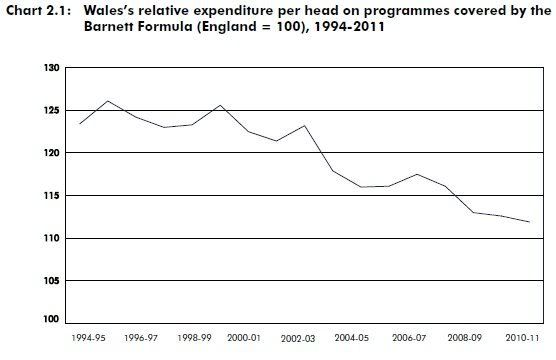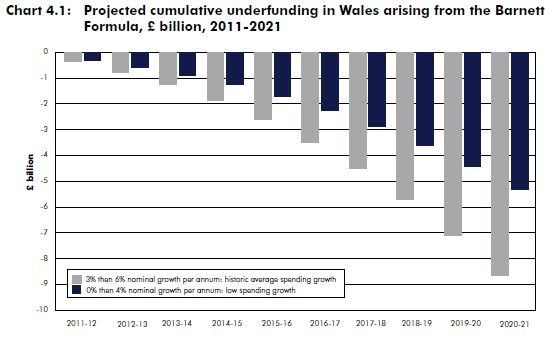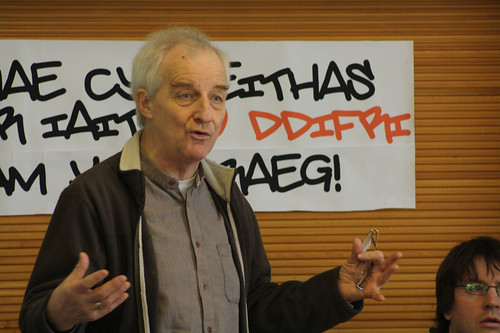The Commission on Funding and Finance for Wales, chaired by Gerald Holtham, sitting with Paul Miles and Paul Bernd Spahn, has published its first report.
 |
 |
 |
| Gerald Holtham |
David Miles |
Paul Bernd Spahn |

Summary Report
Full Report
I wasn't sure what to expect, but I didn't expect a report quite like this. When a weathered hack like Martin Shipton of the Western Mail can open an article by saying:
The importance of the Holtham Commission’s findings about the way the National Assembly is funded cannot be overestimated.
Western Mail, 8 July 2009
... it means that we all should sit up and take notice. Of course I don't mean to offend the old hack by describing him that way. He has been around for a long time, and has read more reports and seen more political spin than most others. He's seen it all ... but he knows that this report is something of a different order.
One of the first things to say about the report is that it is a model of clarity. But I realize that even with the best intentions not many people are going to sit down and read it. So what I want to do in this post is give a summary of what it says and why it reaches the conclusions it has. If we are serious about changing the way that funding for Wales works, it requires a lot of us to shout out about it. If we don't do it— or rather, if enough of us don't do it— then it won't matter what a few politicians and economists say. A small number can always be ignored, no matter how right they are.
Westminster will want to try and forget about it. It is always easier and more comfortable to hide behind the status quo than change something. To bring about change we need to kick up a fuss ... but we need to know what we're kicking up a fuss about. We need to be able to say why the current system is short-changing us, and we need to have a clear idea of what to put in its place.
1. How DOES the Barnett Formula work?
Historically, public spending in both Wales and Scotland has been at a higher level per head than England. Back in the 70s, when devolution was first considered and might well have become a reality, some method needed to be found to formalize the relative funding arrangements so as to avoid a political bun fight between the UK government and the devolved countries at every spending review. So the Barnett formula was devised to calculate changes in funding to Wales and Scotland based on the changes in spending in England, the degree to which a particular area of spending was devolved, and the size of population.
As it turned out devolution did not become a reality in the 70s, but the formula could still be applied because there was a Welsh and Scottish Office, headed by the respective Secretaries of State, which made decisions about how money was spent in Wales and Scotland. When devolution became a reality in 1999, the Assembly and Scottish Parliament made those spending decisions instead.
However, because the formula takes account of population, but does not take any account of the original difference in spending per head, it has meant that the relative difference in spending per head has been steadily eroded over the years. This is known as the "Barnett Squeeze" and its affect on Wales is shown in this chart:

Back in the 90s public spending per head in Wales was about 25% higher than in England. Now it is only half that ... and will continue to fall. The rate at which it will fall depends on a number of factors, but the Holtham Commission has worked out a best and worst case scenario:

Under the worst case scenario, the next ten years will see Wales lose out by £8.5bn. That shows the scale of the problem.
2. How SHOULD things work?
At this point, there is a simple political question to ask. Is it right that, in general terms, governments should spend the same amount of money on everyone? Or is it right that governments should focus public spending on those areas that need it more?
There is no absolute right or wrong answer to these questions. It is a matter of political judgement. However it is worth noting that nearly every developed country in the world adjusts their public spending on a region by region basis, on the principle that it wants to ensure that public services are of more or less equal quality everywhere.
England is no exception. The UK government makes decisions on public spending on behalf of England. But it does not treat the regions equally. It applies a range of formulas based on the relative needs of the nine regions of England, spending what is necessary to ensure that the quality of public services is more or less equal. This results in very large differences in spending per head within England. These are the figures for 2008-09:
| |
Index of spending per head (UK = 100) |
Variation from the UK average |
Spend per head (£) |
Variation from the UK average |
| North East |
104 |
+4 |
£5,210 |
+£213 |
| North West |
106 |
+6 |
£5,296 |
+£299 |
| Yorks & Humber |
94 |
-6 |
£4,698 |
+£299 |
| East Midlands |
87 |
-13 |
£4,359 |
-£638 |
| West Midlands |
95 |
-5 |
£4,734 |
-£263 |
| East |
83 |
-17 |
£4,123 |
-£874 |
| London |
128 |
+28 |
£6,398 |
+£1,401 |
| South East |
88 |
-12 |
£4,105 |
-£892 |
| South West |
86 |
-14 |
£4,274 |
-£723 |
| England |
97 |
-3 |
£4,827 |
-£170 |
| Scotland |
120 |
+20 |
£6,016 |
+£1,019 |
| Wales |
110 |
+10 |
£5,506 |
+£509 |
| Northern Ireland |
122 |
+22 |
£6,120 |
+£1,123 |
| UK |
100 |
N/A |
£4,997 |
N/A |
http://www.ippr.org.uk/pressreleases/?id=3545
One thing that should be immediately obvious is that there is not necessarily a direct link between public spending per head in each region and the prosperity of each region. A prime example of this is London. Public spending per head in London is much greater than anywhere else in England ... and greater than it is in Wales, Scotland and NI too.
So we need to make a clear distinction between prosperity and need. The reason London gets more money spent on it per head is not because it is less prosperous. The exact opposite it true; it is the richest, most prosperous part of England by far! Neither does it get more money spent on it because it contributes more in taxes. It gets more money purely and simply because its needs, measured by a variety of different formulas, are greater. In this context, "need" isn't necessarily a measure of deprivation (although it often can be) it is more accurately a reflection of the cost of providing public services of an equal quality to the different regions. It is as much a measure of, say, the geography or the age profile of a particular region as it is of deprivation.
So the issue is this: if the UK government thinks it right to apply a needs based formula to determine relative levels of public spending in the regions of England, it is unfair—in fact downright hypocritical—for it to apply a different set of criteria for determining public spending levels per head in Wales and Scotland.
-
The clever thing the Commission has done is apply the same funding formulas used for English regions to Wales. So far as I know, nobody has done this calculation before. But the three men on the Commission are all experts and know what they are doing ( ... and if you doubt it, they explain how they've done it in the report) and the result is that Wales would receive 14% more than we currently do.
The Holtham report acknowledges that agreeing a new funding formula will be difficult. So it also outlines a simple and practical way of dealing with the problem on a temporary basis: namely that any future adjustment to the money that we get by operating the Barnett formula is adjusted by a factor of 1.14.
This won't change the past injustice. It will simply be a "safety net" to ensure that the injustice doesn't continue to grow larger.
And they mention other things that can also be done immediately. This time not to change the allocation of spending, but to make the process of allocation more transparent. The logic of doing this is inescapable. The public mood following the expenses scandal means that we must get open and transparent mechanisms and processes, so that we can see exactly how and why public fuunds are distributed in the way they are. We are right to get worked up about the attempts politicians made to hide the money they got from public funds. But it is a drop in the ocean compared with the sums involved for national and regional public spending. Flipping homes and claiming for iPods is as nothing compared to a loss of £8.5bn over ten years.
3. So what happens next?
Well, let's start with the obvious. Every politician who claims to represent Wales, of every political party both in the Assembly and at Westminster, must stand united in making the case for adopting this 114% "Holtham Correction" now, as an interim measure pending a new allocation system.
It's been good to see that politicians are being positive about this. But it does take more than simply saying that Barnett needs to be revised. We all know that Barnett needs to be revised ... in fact we have known it for some considerable time.
We need a firmer and more precise commitment from our politicians: namely that they will press the Treasury to immediately put in place the 114% Holtham Correction.








